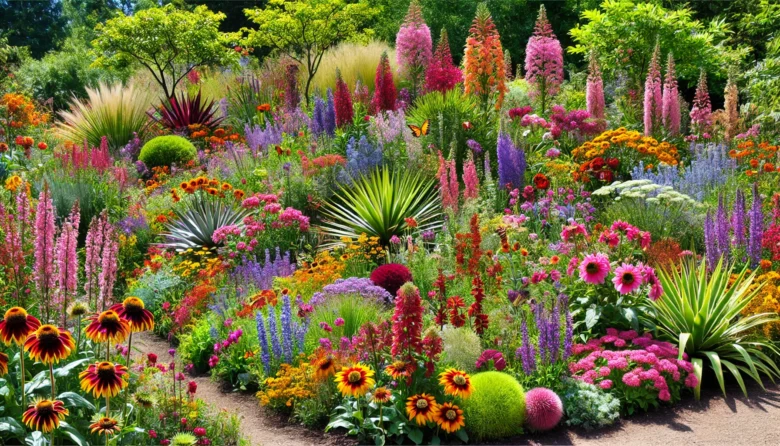Gardening is a beloved pastime for many, but have you ever considered the benefits of native plant gardening? By focusing on plants indigenous to your region, you can create a beautiful, sustainable, and eco-friendly garden. Let’s explore the numerous benefits of native plant gardening and why it’s especially relevant for the Indian public.
What is Native Plant Gardening?
Native plant gardening involves cultivating plants that are naturally found in your local environment. These plants have evolved over thousands of years and are well-adapted to the local climate, soil, and wildlife. In India, with its rich biodiversity, native plant gardening offers a unique opportunity to celebrate and preserve the country’s natural heritage.
Why Choose Native Plants for Your Garden?
Low Maintenance: Native plants are well-suited to the local conditions, which means they require less water, fertilizers, and pesticides. This makes them an ideal choice for gardeners looking for a low-maintenance option.
Supports Local Wildlife: Native plants provide food and habitat for local wildlife, including birds, butterflies, and beneficial insects. This helps to maintain biodiversity and promotes a healthy ecosystem.
Conserve Water: Since native plants are adapted to the local climate, they typically require less water compared to exotic species. This is particularly important in water-scarce regions of India.
Reduces Pollution: By minimizing the need for chemical fertilizers and pesticides, native plant gardening reduces pollution and promotes healthier soil and water.
Preserves Cultural Heritage: Native plants are an integral part of India’s cultural and natural heritage. By cultivating them, you help preserve this heritage for future generations.

Popular Native Plants for Indian Gardens
India’s diverse climate supports a wide range of native plants. Here are some popular choices for your garden:
Hibiscus (Hibiscus rosa-sinensis): Known for its large, colorful flowers, hibiscus is a favorite in Indian gardens. It’s easy to grow and attracts pollinators like bees and butterflies.
Neem (Azadirachta indica): This versatile tree is known for its medicinal properties and is often used in traditional Indian medicine. It also acts as a natural pesticide.
Tulsi (Ocimum sanctum): Also known as holy basil, tulsi is revered in Indian culture. It’s easy to grow, has numerous health benefits, and attracts pollinators.
Marigolds (Tagetes erecta): Marigolds are popular for their vibrant colors and ability to repel pests. They are often used in religious ceremonies and festivals.
Jasmine (Jasminum sambac): Known for its fragrant flowers, jasmine is a popular choice for Indian gardens. It’s also used in making perfumes and teas.
Indian Lotus (Nelumbo nucifera): The national flower of India, the lotus is not only beautiful but also has cultural and religious significance.
How to Start a Native Plant Garden
Starting a native plant garden is easy and rewarding. Here are some steps to guide you:
Research: Identify the native plants in your region. You can consult local nurseries, gardening clubs, or online resources to get information.
Plan: Design your garden layout considering factors like sunlight, soil type, and water availability. Group plants with similar needs together.
Prepare the Soil: Native plants thrive in local soil, but you might need to amend it with compost to improve fertility and drainage.
Plant: Follow the planting instructions for each species. Native plants often establish better when planted during the monsoon season.
Maintain: Water the plants as needed, especially during the initial establishment phase. Mulching helps retain soil moisture and suppress weeds.
Monitor and Enjoy: Regularly check your garden for pests and diseases. Enjoy the beauty and benefits of your native plant garden as it matures.
Community Efforts and Support
Many communities and organizations in India are promoting native plant gardening. Here are a few notable initiatives:
Sahaja Seeds (a network of organic farmers): This organization promotes the use of native seeds and plants in agriculture and gardening. They provide resources and support to gardeners interested in native plant gardening.
SayTrees (an environmental conservation organization): SayTrees works on urban afforestation projects and encourages the planting of native trees in urban areas. They offer guidance and support to individuals and communities.
Benefits Beyond Your Garden
The benefits of native plant gardening extend beyond your personal space. By choosing native plants, you contribute to:
Biodiversity Conservation: Supporting native species helps maintain the natural balance and biodiversity of your region.
Climate Resilience: Native plants are more resilient to local climate conditions, making your garden more resistant to extreme weather events.
Community Engagement: Native plant gardening can be a community effort, fostering a sense of connection and shared purpose among neighbors.
Education and Awareness: Your garden can serve as a living example, educating others about the importance of native plants and sustainable gardening practices.
Conclusion
The benefits of native plant gardening are numerous and impactful. From low maintenance and water conservation to supporting local wildlife and preserving cultural heritage, native plants offer a sustainable and rewarding gardening experience. By embracing native plant gardening, you can create a beautiful, eco-friendly garden that celebrates India’s rich natural heritage.
Author’s Note
Thank you for taking the time to read about the benefits of native plant gardening. I hope this inspires you to create your own native plant garden and contribute to a greener, more sustainable future.
G.C., Ecosociosphere contributor.
References and Further Reading
- Sahaja Seeds – Promoting Native Seeds and Plants
- SayTrees – Urban Afforestation Projects
- Exploring the Plant Life of South Carolina: Understanding its Plant Hardiness Zone – Lawn World – Everything Outdoor. https://www.lawnworld.com/exploring-the-plant-life-of-south-carolina-understanding-its-plant-hardiness-zone/
- How to Create an Eco-Friendly Garden | Red Sky Lounge. https://redskylounge.com/23262-how-to-create-an-eco-friendly-garden-21/
- Landscaping Ideas Northern Virginia | Garden Top. https://www.gardentop.net/landscaping-ideas-northern-virginia/
- nervous system – Regenerate Project. https://regenerateproject.com/product-tag/nervous-system/
- Cauliflower – Key Growing Information. https://www.growseed.co.uk/cauliflower-key-growing-information.html




